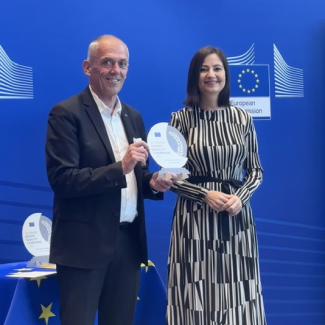
The CNRS under international scrutiny
On November 20th, the international Committee set up by the High Council for Evaluation of Research and Higher Education (Hcéres) published its report on a part of the CNRS's activities, lauding it as “major research institution of world-class standing”. The CNRS is delighted with this report and will be taking the necessary actions to provide the right responses to the Committee's 12 recommendations.
The Hcéres was created in 2013 and is the public authority in charge of the periodic evaluation of all France's higher education and research organisations. It is an independent body and examines establishments, training courses and research teams but not the work of individual scientists. The Hcéres had already carried out an evaluation of the CNRS in 20121 .
This year's report concludes that “the committee considers the CNRS to be a major and world-class research institution. Its history and impact are reflected in its reputation, its size and scope, and its presence throughout France, in European science initiatives, and internationally” and states in particular that "the committee considers the CNRS to be a major and world-class research institution. Its history and impact are reflected in its reputation, its size and scope, and its presence throughout France, in European science initiatives, and internationally”. “The CNRS is delighted with these very favourable assessments addressed to all the staff members who contribute to the organisation's activities and successes on a daily basis”, said Antoine Petit, the CNRS Chairman and CEO.
An international committee
The report gives details of the evaluation of the CNRS's activities during the 2017-2021 period. This evaluation was specifically designed to effectively address certain key aspects without duplicating work carried out by evaluation bodies like the Cour des Comptes (France's main public audit institution) and also to take place within a reasonable timeframe “on the scale of such a large organisation”2 . This means that it did not cover all of the organisation's activities and Antoine Petit admits that “in hindsight, the CNRS regrets having accepted that its international collaborations were not included in the scope of the evaluation. Feedback from the Committee on this point too would have been very valuable for us”.
The Hcéres set up a Committee specifically to evaluate the CNRS that was almost exclusively international in nature with 15 of its 16 members working outside France. This was in response to the CNRS's wish to benefit from an outside perspective on its issues. Antoine Petit explains that the Committee's work is thus “truly enriching for the CNRS”.
Strengths and recommendations
This highly operational report is based on many discussions between the Committee and representatives of the CNRS and its partners who provided information on the organisation's strengths. These include the quality of its research at the highest level in global terms, the pride that CNRS staff members have in belonging to the organisation, the CNRS's many partnerships and its leading position in France and Europe. The organisation's efforts to build links with the socio-economic sphere are particularly recognised, particularly those with innovation ecosystems.
- 1In 2012, the French National Agency for the Evaluation of Research and Higher Education (Aéres), the Hcéres's predecessor, carried out an evaluation of the CNRS using a different methodology to the evaluations currently carried out by the Hcéres. In 2016, the CNRS also carried out a self-evaluation by a committee of experts.
- 2According to the Roadmap for the evaluation of the CNRS proposed by the Hcéres after discussions with the CNRS and the MESR.
The report lists 12 recommendations for the CNRS. How do you intend to address these?
Antoine Petit: The CNRS thanks the Committee for its recommendations which are both inspiring and motivating for us. Some of these are “open to discussion”, as the Committee was careful to point out, while others are not really, or not entirely, a matter for the CNRS as such. The CNRS will work on all the subjects with all the stakeholders concerned. It will do everything possible to achieve the objective of the Committee whose recommendations are intended to enable the CNRS to “achieve its full potential, for the benefit of the French and global scientific community, and society as a whole”, while remaining true to its raison d'être as summed up in the phrase “basic research at the service of society”.
> See the CNRS's letter (French link) with its detailed observations on the Committee's report


